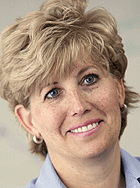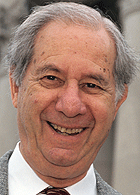Two University professors have been elected fellows of the American Academy of Arts and Sciences.
The new fellows are Helen M. Piwnica-Worms, Ph.D., professor of cell biology and physiology and of internal medicine at the School of Medicine, and Murray L. Weidenbaum, Ph.D., the Edward Mallinckrodt Distinguished University Professor in Arts & Sciences, professor of economics and honorary chairman of the Weidenbaum Center on the Economy, Government and Public Policy.
“I am delighted to have two of our outstanding faculty receive this tremendous honor,” Chancellor Mark S. Wrighton said. “Professors Weidenbaum and Piwnica-Worms are two dedicated scholars, and this recognition is well-deserved. This achievement symbolizes the good fortune we have had at Washington University in attracting premier faculty.”
Piwnica-Worms and Weidenbaum are among 203 American men and women elected as fellows this year by the academy, an organization formed in 1870 to cultivate the arts and sciences and to recognize leadership in scholarship, business, the arts and public affairs.
The academy’s membership of more than 4,500 includes more than 170 Nobel laureates and 50 Pulitzer Prize winners. Fellows are selected through a competitive process that recognizes individuals who have made pre-eminent contributions to their disciplines and to society at large.
This year’s new fellows and foreign honorary members will be welcomed during an Oct. 6 induction ceremony at the academy’s headquarters in Cambridge, Mass.

Piwnica-Worms joined the faculty in 1994 and soon became a professor. She also is a Howard Hughes Medical Institute investigator.
Her research has transformed and refined scientists’ view of how the cell regulates its own life cycle. She has helped show how mechanisms known as checkpoints interface with the cell cycle machinery to delay the cell’s progress through its life stages. The delays provide cells with important opportunities to inspect their DNA for damage. If damage is detected, cells can attempt to repair it or self-destruct to prevent that damage from leading to cancer.
The insights Piwnica-Worms’ lab has generated have quickly gone from bench to bedside, inspiring and enabling clinical trials for innovative new cancer treatments.
Piwnica-Worms earned a doctorate from Duke University School of Medicine and did postdoctoral research at the Dana-Farber Cancer Institute. Prior to her appointment at the University, she held appointments at Tufts University School of Medicine and Harvard Medical School and Beth Israel Deaconess Medical Center.
Piwnica-Worms has won national and international recognition for her scientific contributions. She was a Damon Runyon Fellow and a Pew Scholar in the Biomedical Sciences.
In addition, she was a recipient of the Spirit of Health Award for Cancer Research from the American Cancer Society. She has been elected a fellow of the Academy of Science-St. Louis and was elected to the board of directors of the American Association for Cancer Research.
At the University, she has served on search committees for the heads of several medical school departments and on the Medical Science Training Admissions Committee for nine years. In addition, she helped build the molecular oncology program.
At Siteman Cancer Center, she leads the Cellular Proliferation program and is a member of the Siteman Cancer Center Executive Committee, the Siteman Cancer Center Basic Science Leadership Committee and the Cancer Biology Pathway Selection Committee.
Piwnica-Worms recently won the University’s Carl and Gerty Cori Faculty Achievement Award (see story in May 10, 2007, Record).

Weidenbaum has been a faculty member in the Department of Economics in Arts & Sciences since 1964. A highly influential economist and policy adviser, he has a legacy in the academic, corporate and governmental realms that began in the early 1960s. He has served or advised five U.S. presidents.
During the Truman and Eisenhower administrations, he served on the U.S. Bureau of the Budget staff. He was the first assistant secretary of the treasury for economic policy in the Nixon administration. In 1981-82, while serving as chairman of President Reagan’s Council of Economic Advisers, he was instrumental in crafting the administration’s economic policy and was an important public voice for the administration on economic and financial issues. From 1982-89, Weidenbaum was a member of the President’s Economic Policy Advisory Board.
Weidenbaum did a stint in the corporate world as the chief economist for The Boeing Co., but he devoted most of his time outside of government service to teaching and research, first at Stanford University, then Washington University.
In 1966, he became full professor and chair of economics. In 1975, he founded the Center for the Study of American Business at the University, serving as its director for most of the period leading up to 2000, when he retired as director and the center was renamed in his honor.
Weidenbaum is the author of 10 books, including “One-Armed Economist: On the Intersection of Business and Government”; “The Bamboo Network: How Expatriate Chinese Entrepreneurs Are Creating a New Economic Superpower in Asia”; and “Small Wars, Big Defense: Paying for the Military After the Cold War.” His 2005 memoir, “Advising Reagan: Making Economic Policy, 1981-82,” covers his time in the Reagan administration. He has published hundreds of articles and essays in scholarly journals and in the nation’s top newspapers and magazines.
Weidenbaum earned a bachelor’s degree from City College of New York, a master’s degree from Columbia University and a doctorate from Princeton University. In 2006, Weidenbaum received the William Greenleaf Eliot Society’s highest honor, the Search Award.